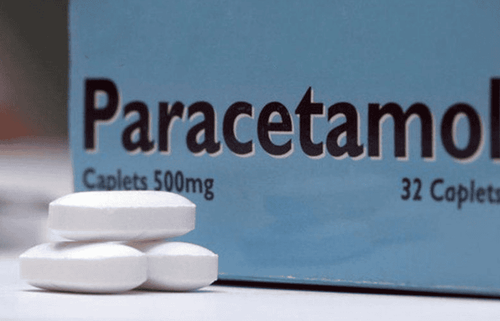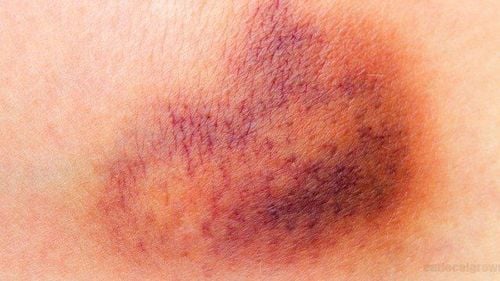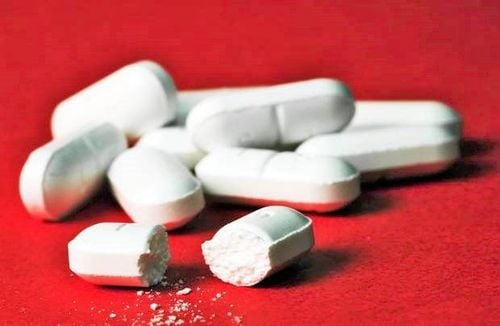This is an automatically translated article.
Fever is a natural immune response of the body, it is a symptom of many diseases. Nowadays, fever is becoming more and more common in children, which leaves many parents confused as to how to safely give medicine to their children. Because children's bodies are much different from adults, the way to calculate the amount of antipyretic drugs for children will also be different. So to know how the amount of antipyretic drugs used for children is calculated, please visit the following article.
1. When does a child have a fever?
Children can have a fever due to:
Diseases with fever caused by viruses: dengue fever, flu, measles virus, hand foot mouth, chicken pox... Infectious febrile illnesses: sore throat, respiratory infection respiratory tract infections, urinary tract infections, typhus, liver - biliary infections, encephalitis - meningococcal infections, otitis media, tonsillitis, blood infections... Vaccination fever: most fevers are caused by vaccination in The child's fever is mild and rarely lasts more than 2 days. Teething fever: Usually, teething fever is just a mild fever below 37.8 degrees, and will go away after 1-2 days.
2. Amount of antipyretic drugs for children
2.1 General rules when using fever-reducing medicine for children General rules when mothers use fever-reducing medicine for children at home:
Children with fever of 38 degrees or higher Do not arbitrarily give children medicine when the child is under 3 months old without consulting a doctor. The amount of antipyretic drugs for children is calculated according to the weight of the child. Read the instructions for use carefully when giving the medicine to a child. Give the child the right dose of antipyretic medicine suitable for the child. Pay attention to the expiry date of the medicine to avoid using the medicine past the expiry date. 2.2 Medicines and levels of antipyretic drugs when used in children Paracetamol (acetaminophen)
This is a drug commonly used to reduce fever symptoms in children because it does not cause stomach lesions and has few side effects when used in children. used properly unlike other antipyretics of the NSAID class.
How to calculate the amount of antipyretic for children by weight: the dose is 60mg per kg in a day or 15mg per kg in 6 hours or 10mg per kg in 4 hours, the dose interval is at least 8 hours. . If the drug is used in excess, it will harm the liver of the child, but using too little will not help the child reduce the fever.
Depending on the child's fever to give the child the appropriate form of medicine.
Oral forms of medicine such as powder, drops, syrup, tablets, etc...: used while the baby is awake
Effervescent powder is the most commonly used form of medicine because it is easy for the baby to take, and the method of use is simple. Simply put the medicine in a small glass of water to dissolve, then give it to the child to drink as soon as the medicine is completely dissolved. Dosage recommendations are as follows:
Children under 3 months of age weighing between 2.7 and 5.3 kg give 40 mg every 6 hours Children aged 4 months to 11 months weighing 5.4 to 8.1 kg for 80mg every 6 hours Children 1 to 2 years old who weigh 8.2 to 10.8 kg give 120mg every 6 hours. Children 2 to 3 years old weighing 10.9 to 16.3 kg give them 160 mg every 6 hours. Children 4 to 5 years old weighing 16.4 to 21.7 kg give 240 mg every 4-6 hours. Children 6 to 8 years old who weigh 21.8 to 27.2 kg give 320 mg every 4-6 hours. Children 9 to 10 years old weighing 27.3 to 32.6 kg give children 400 mg every 4-6 hours. Children over 11 years old who weigh 32.7 to 43.2 kg give 480 mg every 4-6 hours. Anal medicine form: used when it is necessary to reduce fever while the child sleeps, the child vomits a lot and is having a high fever, convulsion.
Do not abuse the suppository form, because this form of medicine can cause itching and irritation of the child's rectum, when the child has regained consciousness but still has a high fever, it needs to be taken orally.
How to use the suppository: cool the pill before placing it, just put the pill to the end of the anus. Do not put the medicine too deeply because it will reduce the effect of the drug, let the child lie still for a few minutes after placing the tablet. If you have to order 2 pills to get the full dose, then after you put the first pill, you have to wait 1-2 minutes to put the second flight attendant. It's best to choose the type of medication with the right concentration.
Amount of antipyretic when taking rectal tablets
Children from 6 to 11 months old: 80mg every 6 hours, maximum use 320mg/day Children from 12 to 36 months old: 80mg every 4-6 hours, up to 400 mg/day Children 3 to 6 years: 120 mg every 4-6 hours, up to 600 mg/day Children older than 12 years: 650 mg every 4-6 hours, up to 3900 mg/day Aspirin
Currently, Aspirin is rarely used to reduce fever in children because it can cause many side effects on the gastrointestinal tract and has symptoms related to Reye's syndrome.
Dosage 60mg/kg/day or 15mg/kg every 6 hours.
Ibuprofen
This medicine is only recommended for children over 6 months of age. In young children, Ibuprofen is prone to many side effects, especially in children with chickenpox.
The dose of oral Ibuprofen for 24 hours is 20-30mg per kg of body weight or 7-10mg/kg every 6-8 hours.
3. Pay attention when using fever-reducing medicine for children
Do not arbitrarily give children any more antipyretic drugs, only when prescribed by a new doctor. If you have not yet taken your child to the doctor, parents can consult a pharmacist to buy fever-reducing medicine for their child and carefully read the instructions for use of the medicine before giving it to the child.
Do not allow children to use many medicines with fever-reducing ingredients at the same time, parents should pay attention that there are some cough and cold medicines that also have fever-reducing ingredients.
Absolutely do not take more than the recommended amount of antipyretic drugs for children.
If it is a liquid drug, it should be measured accurately using a measuring device according to the manufacturer's instructions.
Record the dose and number of times the child has taken it to avoid overdose.
Put the medicine out of the reach of children and close the lid tightly.
For nursing mothers, it is necessary to use the drug through the advice of a doctor because there are some drugs that can be passed through breast milk into the baby's body, causing poisoning to the baby.
4. Pay attention when your child has a fever
Do not use too much medicine because of the eagerness to lower the child's fever (or use medicine too close together). This will cause the risk of overdose for the child, and when the child's temperature drops too quickly, suddenly it will be very dangerous for the child. Antipyretic drugs usually work after 30 minutes and bring the child's body temperature to a safe level after 1-2 hours.
Do not apply cold water when the child has a fever, because cold water will constrict the blood vessels, constrict the pores, this will only increase the body temperature.
Please apply warm water to your baby: use a small towel to wet but not squeeze all the water, apply a towel on both armpits, two sides of the groin and 1 towel to wipe all over, change the towel after 2-3 minutes. Stop wiping when the child's body temperature drops below 38.5 degrees or after about 30 minutes after wiping the baby. Then, pat the child dry after applying and dress the child in light clothing. When the child has a high fever, you can bathe the child with warm water, the water temperature is 2 degrees lower than the child's body temperature.
Should give children plenty of water or oresol to avoid dehydration.
When the child has a high fever continuously above 39 degrees and has taken medicine but does not decrease, the child aged 3-36 months has a fever of 38 degrees or higher for 3 days, or the child of any age has a fever above 40 degrees or the child has a fever with colic convulsions, recurrent fever, rash, lupus, ... should take the child to the doctor.
If this condition does not improve, you should take your baby to a reputable medical facility for examination and surgery. Pediatrics Department at Vinmec is one of the few multi-specialty hospitals with a full range of doctors specializing in neurology, cardiology, gastroenterology, nutrition, psychology, endocrinology, and hepatobiliary care, helping to quickly and promptly handle the disease. detect diseases during the examination. As a key area of Vinmec Medical system, Pediatrics Department always brings satisfaction to customers and is highly appreciated by industry experts with:
Gathering a team of leading pediatricians: including leading experts with high professional qualifications (professors, associate professors, doctorates, masters), experienced, worked at major hospitals such as Bach Mai, 108.. Doctors All are well-trained, professional, with a mind - range, understanding young psychology. In addition to domestic pediatric specialists, the Department of Pediatrics also has the participation of foreign experts (Japan, Singapore, Australia, USA) who are always pioneers in applying the latest and most effective treatment regimens. . Comprehensive services: In the field of Pediatrics, Vinmec provides a series of continuous medical examination and treatment services from Newborn to Pediatric and Vaccine,... according to international standards to help parents take care of their baby's health from birth to childhood. from birth to adulthood Specialized techniques: Vinmec has successfully deployed many specialized techniques to make the treatment of difficult diseases in Pediatrics more effective: neurosurgery - skull surgery, stem cell transplantation. blood in cancer treatment. Professional care: In addition to understanding children's psychology, Vinmec also pays special attention to the children's play space, helping them to have fun and get used to the hospital's environment, cooperate in treatment, improve the efficiency of medical treatment.
Please dial HOTLINE for more information or register for an appointment HERE. Download MyVinmec app to make appointments faster and to manage your bookings easily.













